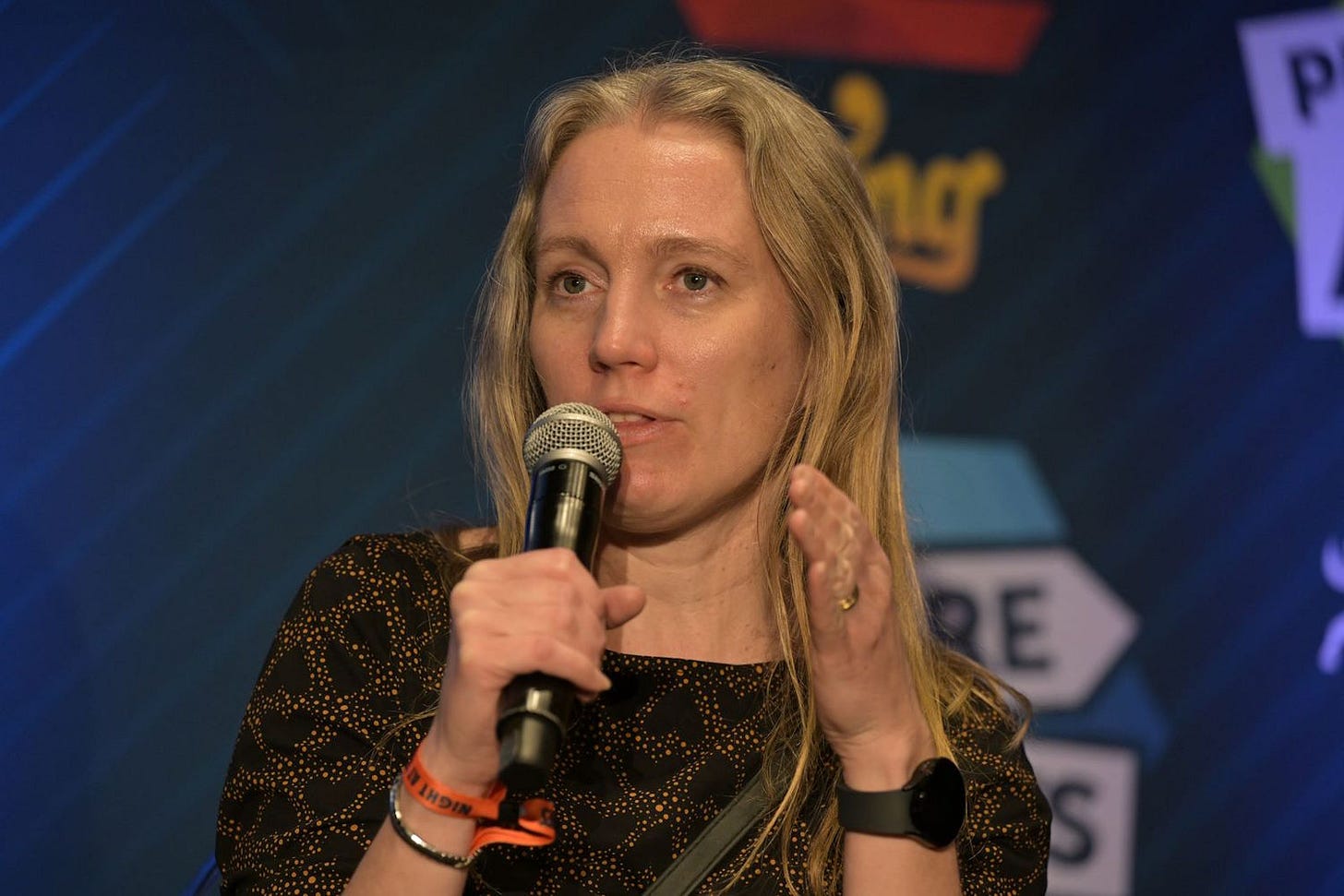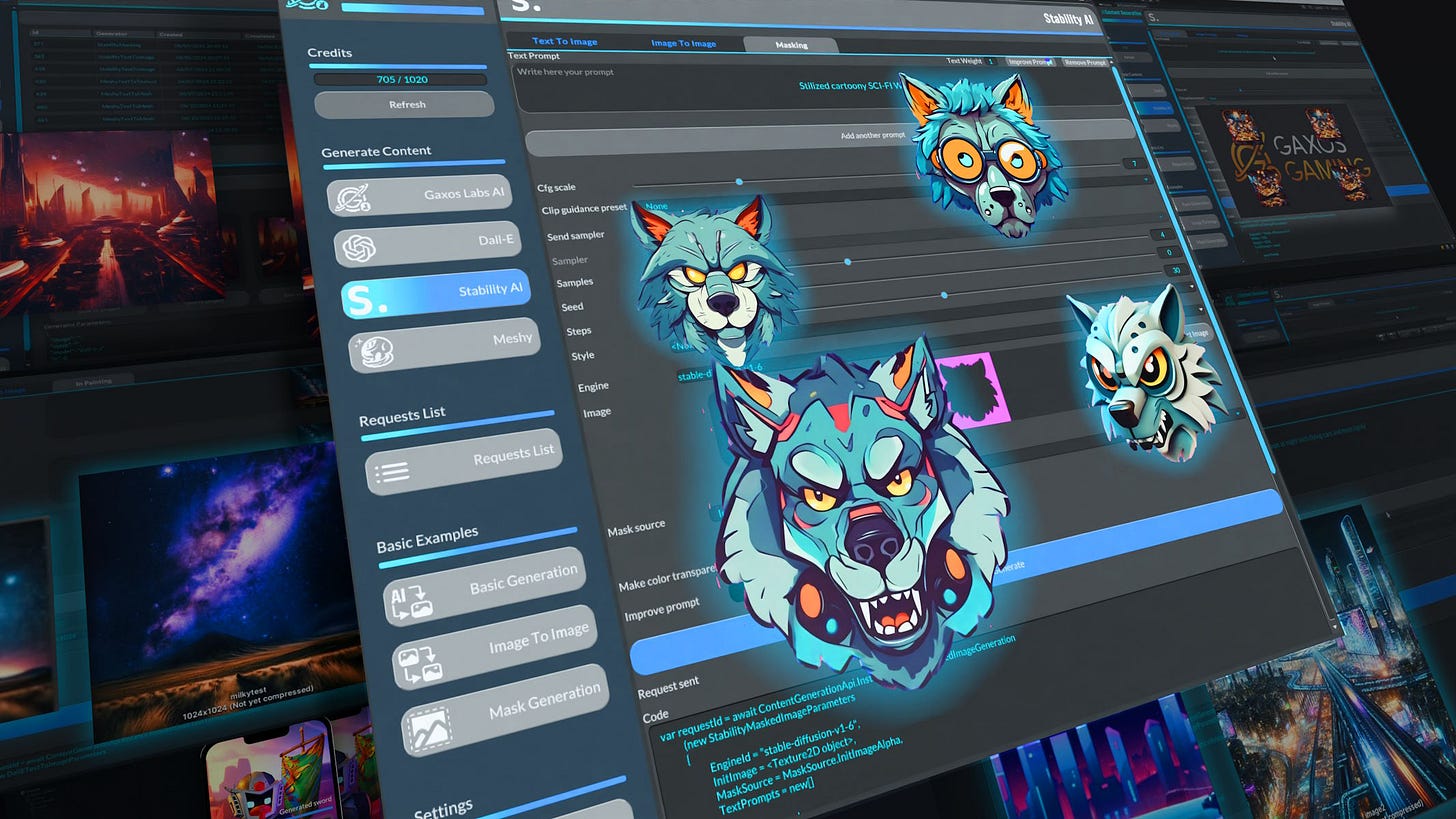"We are embracing AI. We’ll be left behind if we don't know how to use it"
Elina Arponen, CEO of Quicksave, reveals how AI will be used inside studios to enhance productivity.
Welcome to the latest edition of your newsletter, where we interview top figures from the games industry about how they use AI. Please forward this to your colleagues and encourage them to register for free - we’re building up an impressive collection of Q&As here on AI Gamechangers.
This week’s interview is with Elina Arponen of Helsinki-based studio Quicksave.
Scroll down for more news and links, including the Global AI Index, Nintendo’s challenge to AI-generated art, and new AI platforms from Treasure Play and Gaxos.
Elina Arponen, Quicksave

In this week’s AI|G feature, meet Elina Arponen, CEO & co-founder of Quicksave. Quicksave was founded in 2017 and develops games such as Axie Infinity: Raylights, set in the Axie web3 universe, and Werewolf Friends for Zoom. It also makes toolsets for other studios to work with. We chat about AI adoption in game development and its use in accelerating processes in the workplace, especially in disciplines like coding. We talk about the long-term impact of AI on the games industry, UGC, the importance of human input, the Finnish games scene, ethical concerns and more.
Top takeaways from our chat:
Quicksave uses AI primarily to enhance internal productivity, particularly in coding and overcoming “empty page syndrome” for documents.
AI's biggest impact will likely be in user-generated content (UGC), where the technology will make creation more accessible. However, premium brands will still require significant human input to maintain quality and brand consistency.
While embracing AI, Quicksave carefully considers ethical and confidentiality concerns, particularly regarding data security and the protection of original artwork.
There's a notable disparity between US and European AI adoption rates, and there’s a concern that Europe might get left behind if companies only use AI products from outside rather than contributing to AI development themselves.
AI Gamechangers: Quicksave has always been ready to embrace new technology, from HTML5 to blockchain. What’s your experience with AI?
Elina Arponen: Currently, we're using it internally a lot in our processes. We have a technology product out on the market as well that we are licensing to customers, and I can see that evolving towards using AI, but right now, we mainly use AI to enhance our internal processes: how we function, trying to find better ways to be more productive.
The obvious [discipline] is coding. Our programmers use it a lot, and they benefit from it. You learn to do certain prompts on it, and it can find bugs for you.
It is getting better and gives pretty good answers on the coding side. Of course, you still need to understand what you're getting! If you did not know anything about coding, it would not be so useful. You still need the human to put it together, test it, and so forth. But, definitely, it can be helpful. It has been able to find some bugs, given a piece of code.
“One thing that concerns us is confidentiality. But overall, we are embracing AI. We will be left behind if we don't know how to use it.”
Elina Arponen
It can also help with writing for people like me who make PowerPoint presentations and marketing materials. We use it so as not to have an “empty page” syndrome! It gives you a start. You often disagree with the AI, but you're then already moving.
In most disciplines, where it helps is either in the very beginning or at the end, correcting and making variations. And most of us are not native English speakers, so we can ask it to do things like, “Can you make this sound better?” and it fixes it for you.
You can get it to analyse lists and lots of little practical examples. The overarching theme is getting the idea at the start and then fixing things to get better quality.
What particular AI model do you prefer in your workplace at the moment? Are you using ChatGPT, which is still the most popular, or did you experiment with Claude or other models?
Some people on the team have been experimenting with other models, but ChatGPT is the latest we have available for everyone because they finally made a team subscription possible.
The best tools are not free. There's a cost to having the tool for everyone on the team. But with a team of around 15, it's like getting a new person! So it's definitely beneficial to have it.
How do you think that AI is going to impact all the different sectors of the industry?
I think it will have the biggest impact on UGC games (user-generated content) now that you can prompt games. Platforms that rely on users generating games and content are bound to have the biggest changes coming. Either they will be evolving themselves, or there will be harsh competition where game creation gets so easy that creators will migrate to platforms where they can have a bigger impact faster and more fluently. You don't need to do as much coding. You can create experiences, whether it's 2D games or 3D games.

There are still big brands and IPs and companies that are really careful about their brand image and the quality, and they want to control the user experience to be just right, and you don't get that from the AI. So maybe when it's a deeper story or a brand image that is super important to execute correctly, then you will need that human component in there to do it. It might be that a smaller team can do more, but I don't think all of the industry will be AI-created games.
Let’s talk about the importance of humans in the process. When you began looking at AI tools, was there any resistance from your team, or was it embraced immediately?
As you said, we have been forward-thinking all the time. We have all these discussions at some point, “We've got blockchain now; how does everyone feel about this? And how do you feel about this other new thing?” Our team has evolved over the years to be willing to embrace new things.
But yes, we've discussed ethics, especially in the arts sector. We’ve asked, “How are these models created? Where? How was it done?” It's a difficult topic — sometimes, the ship has already sailed. Going forward, there's much more protection for original human art now already in the platforms. But we’ve had those ethical questions in the office, and they are difficult and important.
“I'm worried that Europe might get left behind. We want to contribute to this, not just utilise products given to us from outside. It's something we should keep in mind: it is coming, it's happening. It's not just a fad.”
Elina Arponen
One thing that also concerns us is confidentiality when using software. How can we put confidential company material into the AI? We are looking into it: where is the limit on what you can post, and what are the terms that each AI uses? We've been using Spinach AI as a meeting recorder. Our production manager even had a talk with their company to verify, face-to-face, that if we talk about confidential stuff in our meeting and their AI is recording notes for us, it’s just for us. “Not even you guys will read it?” It's all secure and confidential stuff. People need to be super sure about that.
These are topics to discuss, but overall we are embracing AI. We will be left behind if we don't know how to use it.
You're based in Finland, and there's a fantastic games industry there. How do you think AI has been adopted by the regional games sector? Are you an outlier, or do you find that everyone is talking about this topic?
There's a lot of talk about it. Some startups are building AI products and assets themselves. Everyone is at least looking into it. Generally, in Finland, people look at new technologies.
There was a study (not just games, but startups in Europe and in the US), and there was a discrepancy in that some of the latest models coming from the US might not be available in Europe because of privacy concerns. Also, there was a study on how many companies are already going forward and full-on using AI. The percentage was much higher on the other side of the Atlantic. I'm a bit worried that Europe might get left behind in a way. We also want to contribute to this, not just utilise products given to us from outside. I think it's something we should keep in mind: it is coming, it's happening. It's not just a fad.
What advice do you have for a small studio which has heard of AI and ChatGPT but doesn’t know where to begin?
It’s important to be curious and try things out. Even if you use it for your personal life, that's helpful. Start asking silly questions, then ask hard questions that you think it can’t handle, and then you’ll see.
This is an example from my personal life: my son was getting a new computer, and there was a huge list of different components, discounts and offers. We fed all those component lists into ChatGPT and asked, “What is the best price and best quality computer that I can get using these parts?” And it gave us a good list which we took to a shopkeeper. ChatGPT can read images: you don't have to type everything; just take photos and say, “Decipher this for me. What's the best price you can see here?” Once you get into the habit of using it, you start to see its different uses.
What is Quicksave working on next?
We have a toolkit optimised for HTML5 game development. It has a really good UX/UI layout editor. We can do a lot of the menus and meta-game screens without code. It’s a no-code tool for an artist to create animations, sound transitions, particles, and many things that look fancy. If you take a game (imagine Clash Royale or something similar), there's one main screen where the action happens, and that will require somebody to do some programming. But then all the meta-game screens, inventories and progressions can be created easily, and our tool scales that on any screen size. We started to develop that seven years ago when we launched Quicksave, and earlier this year, we officially came out and made the toolkit available. In the last six months, we’ve made it more accessible.

We see that there is interest now. There are so many new HTML5-based stores coming out. There are subscription platforms like Discord, YouTube, and the New York Times; they're all embedding games. One big thing that happened this year is that Apple started allowing stores within an app. So this makes the creation of embedded offerings even easier. It's a good time to be in the HTML5 market.
Further down the rabbit hole
Some useful news, views and links to keep you going until next time…
Elina Arponen will join two panels at the Big Screen Gaming Summit next week in Helsinki (“Press Start: What Platform Should Be Your Focus At Your Studio’s Birth?” and “How Can Emerging Technologies Transform the Way We Develop Games?”). There’s still time to attend. Use this link to get 10% off tickets.
Tortoise Media revealed The Global AI Index 2024, making sense of AI capacity in 83 countries and assigning them a score based on 122 different indicators. The USA dominates, with China in second place, then Singapore third and the UK fourth.
Nintendo is issuing takedowns to AI-generated Mario fan art. The art is being identified by Tracer’s AI-powered detection process. The Verge has a good summary of the story.
Singapore-based Treasure Play is launching a new AI-powered incentive platform aimed at helping developers grow and engage their player base.
Sarun Vichayabhai, founder and CEO of Playbux, says, “Blockchain games can’t be truly user-driven without AI.”
Gaxos unveils its AI-powered development suite for asset creation and UGC.



